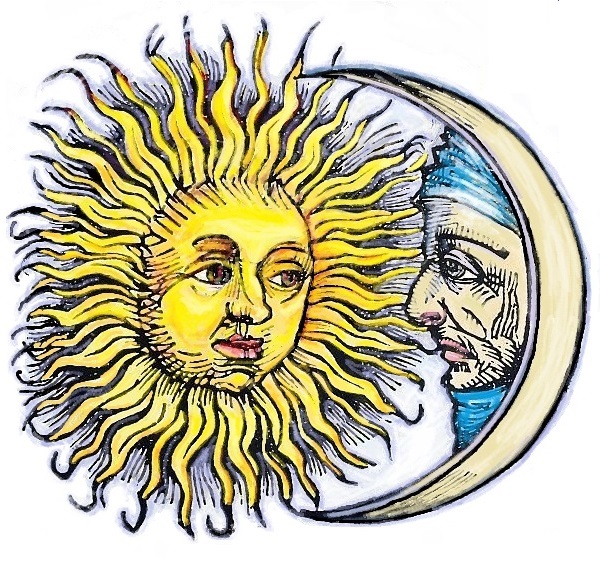Sixteenth Century Engraved sun and moon image. Courtesy of Wikimedia Commons.
I have always liked categorical statements that are obviously wrong. When someone says to me “This is the way the world works,” I get very excited, even though of course nobody knows how the world works. Or, even better: “There are only two types of people in the world.” This statement is usually followed by two binary qualities that could be used to define and divide all of humanity. Such a proposition is clearly ridiculous and, to me, deeply appealing. This is perhaps why my favorite game is called Dichotomies.
The game originated because my friends and I are always talking about our other friends. One night my friend Nick and I began idly categorizing people we knew, somewhat arbitrarily, as either thunder or lightning. We knew immediately who was which: Nick and I are both lightning. Our friend Ben: thunder. Alex: lightning. Graham: thunder. Lily: thunder, though maybe she has a bit of lightning too? We discussed and debated. This dichotomy is a good one in part because of its ambiguity; not everyone interprets it quite the same way, but everyone has a strong instinct for what each category might mean, and a sense of who might be which. Our attempts at categorizing people opened up some interesting questions: Was so-and-so outgoing, or actually quite shy? Did he make a big impression at first, or grow on you later? Was there a certain kind of power in being thunder and a different one in being lightning? Which would you rather be? And why was it so easy to tell the difference?
So I began to think of other interesting binaries. Another friend and I decided that some people are “men about town” and some people are “helluva town guys.” (Gender-neutral.) As I see it, a man about town is someone who always has fifteen plans that they’re running to, someone who is excited to meet new people and try new things, someone who is essentially oriented toward the public sphere and the allure of the untried and untested. At a party, they will end up talking for hours to a fascinating stranger who they will never see again, but they’ll remember the conversation forever. A helluva town guy is someone who likes to go to the same bar every weekend and drink ten beers with their best friends and say, “Man, life is so good!” But they are also someone who might know the secrets of the city a little bit, who might take you to an unremarkable-appearing restaurant that turns out to be special. They are your quintessential regular; they return, and they identify with the fact of their continuous return. Sometimes helluva town guys might find themselves living man-about-town lives—but at their core, they remain helluva town guys, even if they’re going out five nights a week. Dichotomies are, crucially, not about preference; they are about someone’s essential essence.
All summer long I thought of other ways to divide the world in half: New Hampshire/Vermont, Picasso/Matisse, punk/hippie, still/sparkling, IPA/lager, Beatles/Stones, France/Italy, Bob Weir/Jerry Garcia, glamour/charisma, hater/enthusiast, ellipsis/etc., elusive/available, green/blue, beer/shots, Yankees/Mets. Many of these pairings betray my own particular interests—you could endlessly reformulate them, and in fact I do. The best ones are pairs that are not actually quite opposites but proximate and different. So I began to play this game with people, often in groups, where you might ask someone to go around and categorize everyone, even people they don’t know well. Or, if there are two of you—say, on a date—you might go through them together and discuss who falls on which side of the aisle. I began to play it endlessly, in almost any circumstance. I started keeping a note on my phone, a running list I could pull out when someone said, “Okay, do another one.”





